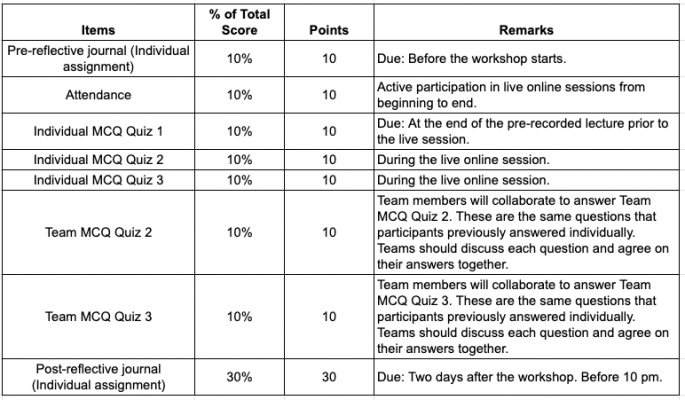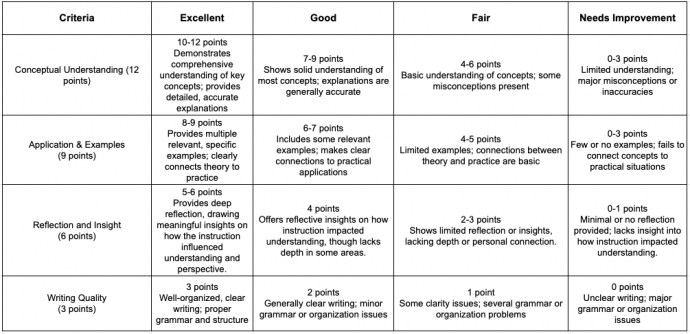Description of the Course
In this workshop, ID1: Introduction to Instructional Design (Batch 3), you will learn the basic definitions and terminology of Instructional Design, with a focus on the taxonomy of ID models (classroom, product, and system). You will develop the ability to identify instructional problems across various educational contexts, including K-12, higher education, teacher training, and corporate training. To design effective and efficient instruction, you will learn how to conduct learner and contextual analyses, examining orienting context, instructional context, and transfer context.
This is a five-hour workshop, consisting of two hours of pre-recorded (asynchronous) lectures and a three-hour live online session (synchronous). The pre-recorded lectures will be available for review two days prior to the workshop start date. The live online session is scheduled for Saturday from 10 a.m. to 1 p.m. Participants will engage in both individual and group activities. This workshop is offered by NPTEL and co-certified by the EdTech Society.
There are a total of four Instructional Design workshops in the series:
● ID 1: Introduction to Instructional Design
● ID 2: Instructional Objectives and Strategies
● ID 3: Assessment - Testing Knowledge, Skill, and Attitude
● ID 4: Implementation and Management of Instruction.
Profile of the Instructor

Dr. Briju Thankachan earned his PhD in Instructional Technology from Ohio University USA. Dr. Thankachan is currently serving as the Executive Director of EdTech Society and was a Visiting Faculty at the Interdisciplinary Programme in Educational Technology (IDP-ET) in Indian Institute of Technology (IIT) Bombay, India. Previously, Dr. Thankachan served as the Director of Curriculum and Assessment Design and Improvement at the Ohio University. Dr. Thankachan developed the Instructional Decisions Model (IDM), to help educators make better decisions in the learning design process. As a certified Quality Matters peer reviewer, Dr. Thankachan designed online and hybrid courses for the School of Nursing at Ohio University. As an adjunct professor, he taught Advanced Instructional Design and Technology Application in Education courses at Innovative Learning Design & Technology program at the Patton College of Education Ohio University. In 2018, Dr. Thankachan served as the president of the International Division of Association for Educational Communications and Technology (AECT) and is a certified trainer in Team-Based Learning (TBL). Dr.Thankachan also completed the “Higher Education Teaching Certificate” from Harvard University’s Derek Bok Centre for Teaching and Learning in November 2019 and holds a Project Management Professional (PMP) certification from project management institute.
Intended Audience
Intended Audience:
This workshop is ideal for individuals who design, deliver, or contribute to educational content, whether in academic, corporate, or other professional settings.
This includes:
● Educators and Trainers
● E-learning developers
● Anyone interested in improving instructional quality
Eligibility Criteria :
Bachelor's degree in any discipline.
Certification Process
Certificates are co-certified by EdTech Society. Receiving a participation certificate requires 20% total grade, while a completion certificate requires 80

Type of Assessment
MCQ quiz - Total five MCQ quiz as formative assessment.
- Each MCQ quiz contains 5 questions. Each question is worth 2 points, for a total of 10 points per MCQ quiz.
- In the Individual MCQ quiz, participants will answer the questions individually.
- Individual MCQ quiz1 will be at the end of the pre-recorded lecture. Individual MCQ quiz 2 &3 will be during the live online session.
- In the Team MCQ quiz 2&3, participants will use the same questions from the Individual MCQ quiz 2&3. Teams should discuss each question and agree on their answers together.
Google Forms will be used for both Individual and Team MCQ quizzes.
Pre and Post Reflective Journals - Total two reflective journals
- Pre-reflective journal is to assess learners' prior knowledge about the topic of instructional design (independent of the content in the pre-recorded lecture). The pre-reflective journal will be shared via a Google form with the registered participants two days prior to the workshop.
- Post-reflective journal is to assess learners' conceptual understanding of the topic and its application after the instruction. The post-reflective journal will be shared via a Google form with the registered participants after the online live session. Participants will have two days to complete the post-reflective journal.
Post-Reflective Journal Rubric






Reviews
There are no reviews yet.